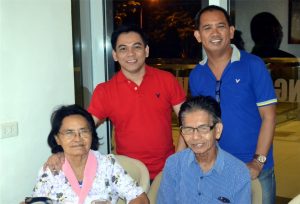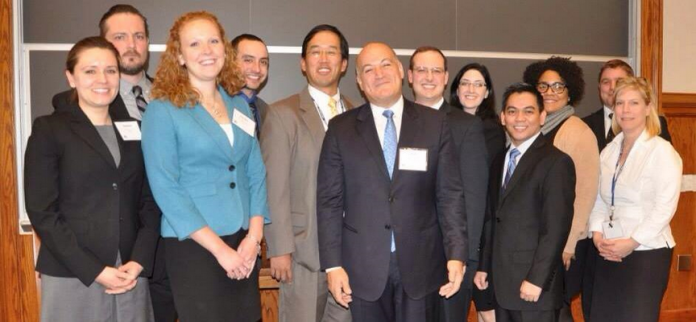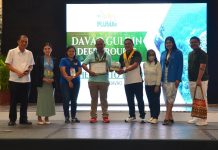Poverty, so goes a popular saying, is no hindrance to success. Nick Mabale Caraquel has proven this! From being a small boy selling banana cue in his hometown in Davao Oriental to one of the finest immigration lawyers in New York City, the boyish looking legal eagle has come a long, long way.
“Poverty is a source of motivation in itself,” he himself admitted. “You can become creative in finding ways to get out of poverty.”
Talking with the fortysomething lawyer is a unique experience. He is honest and as he talks you journey back with him in those days when he was still a little boy growing up in San Isidro.
There were seven siblings in the family and he is the sixth. His father was a barber while his mother was a seamstress. Each member had to work. “I can barely remember spending time with the first three siblings because of age gap and the fact that they too were working students while attending school,” Caraquel recalled. “Everyone had ample share in helping our parents earn a living or support our family at that time.”
 He was only six when he started to help the family in making both ends meet. Every day, at 4 o’clock in the morning, his father would wake him up. Although he still wanted to sleep, he had to get up to help his mother prepared for the barbecue vending at the bus terminal.
He was only six when he started to help the family in making both ends meet. Every day, at 4 o’clock in the morning, his father would wake him up. Although he still wanted to sleep, he had to get up to help his mother prepared for the barbecue vending at the bus terminal.
From their house, he had to walk alone going to the bus terminal to gather used barbecue sticks from the ground and wash them clean because they could not afford to buy a fresh set.
But even then, the family barely made it. When he was in third grade, his parents requested him to quit schooling. He was mad. “I didn’t talk to them for six months but would do everything they asked me to do,” Caraquel said. “I could not understand the reason why I needed to stop going to school.”
It was from this experience that he learned the value of hard work, determination, and patience. “I get inspiration from my mother,” he pointed out. “She reminded me that education is the only way out of poverty and that material things are not that important.”
She also taught him about leaning on that Someone Up There and to call help from Him. “When things get rough,” she told him, “just kneel down and pray.”
Caraquel believed that to get out of poverty, he had to finish school. “Finishing college was the only way or starting point to get out of poverty,” he pinpointed.
He did finish elementary. And when he was graduating from high school, the government offered for the first time the State Scholarship Program (SSP) to poor but deserving students to study in private schools. He took the qualifying exams and was awarded as one of the 13 SSP scholars in the country, representing Davao Oriental of Region XI.
The scholarship was his ticket to enroll at the Ateneo de Davao University, where he took Bachelor of Science in Industrial Engineering. “I felt like I don’t have to study much with numbers,” he replied when asked why he had chosen the engineering course. “It’s embedded in my system.”
Another reason: “I thought being an engineer would put me in a better position to financially support my parents and younger sister’s education,” he said, adding that his course choices “were dictated by my state scholarship grant.”

It wasn’t easy but he managed to graduate from college. “I was so proud of myself that I was able to graduate from a top university in spite of everything; I was the first Ateneo graduate from our barrio,” he said.
After graduation, he worked in one of the world’s top food manufacturing companies and was assigned in Cagayan de Oro City. However, his childhood dream of becoming a lawyer beckoned. With the money he saved, he decided to fulfill his dream. He pursued law at the Xavier University (Ateneo de Cagayan).
“Xavier did not allow me to march because I failed in taxation review,” he recalled. “On the day of my graduation, my parents were in Cagayan de Oro to attend my graduation that didn’t happen. (Instead) we went to Camiguin so I didn’t see my classmates on their toga.”
Caraquel had to fight for his privilege to attend summer class in Manila so he could take the 2003 bar exam, which he passed.
On why he dreamed of becoming a lawyer when he was still a young boy, he shared this thought: “Generally, people looks down on people who were economically challenged. We have the tendency to judge that they have no hopes especially when you live in the province.”
Caraquel saw that through his mother’s experience. “I cannot forget how my mother tried to encourage me while she herself was hopeless,” he said. “Oftentimes I saw her na nakatingin sa malayo nguni’t wala namang tinatanaw”. I wondered what she was thinking. Was it the hardship, the hopelessness or the treatment of some people around her (as she won’t be able to pay her debt on time).
“That significantly influenced me in dreaming to become a lawyer: to defend my family if someone will mistreat them, to uplift their spirit that we can rise from poverty and to financially support my family,” he explained.
So, when he became a lawyer, it was sort of a celebration not only for himself but for the entire family. He was the first lawyer from the said barrio and it really meant to everyone.
“Prayer is more than verbally filling in some requisition blank,” Billy Graham states. “It’s fellowship with God! It’s communion with the Lord through praising Him, rehearsing His promises, and then sharing our needs.”
Caraquel did a lot of praying when he went to the United States in 2007 to look for better opportunities. Three weeks after his arrival, he asked his friends to pray for him with a specific request. He recalled: “If God has better plans for me in America, the Nestle USA will call my friends’ landline the following Monday at 9 am.” True enough, at 9 in the morning that Monday, the phone rang and the company called. He was hired.
In 2012, Nick took the New York State bar examinations. With only three weeks approved vacation from his work, he concentrated on 13 out of 21 subjects for the 2-day New York bar examinations. The first day was the toughest; it had the NY Bar five essay questions.
Before he left the hotel, he asked God to give him at least one topic he could focus on. Should that selected topic be one of those that will come out, he assumed that with God’s guidance, he would pass the bar exam. Out of nowhere, someone whispered in his ears to concentrate on libel and defamation.
The 100-multiple choice federal law portion and the first two essay questions were covered in the morning session. The afternoon session started with the third essay question and lo and behold the topic was – hold your breath! – about libel and defamation. It was then that he knew he would pass the bar exam. And he did.
A few months later, Caraquel was in a quandary whether he would stay in the US or be back in the Philippines, although deep inside him, he wanted to stay. Again, he prayed asking that if his plans aligned with His plan for him, he will receive his American citizenship notification on or before April 2 (Thursday). And, yes, it happened as what he had requested.
“All my life,” he says now, “I am guided by prayers in every major decision I make. It’s a trait I learned from my mother. I always ask for God’s sign to give me confidence that the decisions I make are aligned with His.”
Today, Atty. Caraquel is one of the finest immigration lawyers in New York. “I focus on immigration law because it’s my passion to help other people and immigration is an area where I can greatly demonstrate that,” he said.
Another reason: he personally experienced going through the process. On his first time to be in the US, he was held for two hours in Seattle, Washington. “The officers thought I will become undocumented,” he said. “That experience made me more confident in advising my clients what not to do when entering the US on a tourist visa.”
Eventually, however, he will expand his law practice in the future. “For now, I just want to concentrate on immigration and potentially family law,” he said and explained that as an immigration lawyer, he helps people come, stay and live in the US. He can also help find legal options to regain or maintain their lawful status in the US.
Now, going back to poverty. “Do not look at poverty as a reason or excuse to stop dreaming big then work hard to make those dreams a reality,” he said with confidence. “I know it is not easy; there are times that you will feel like giving up. When that time comes, seek for something or talk to someone who inspires you, when the burden gets tougher kneel down and pray. Rest if you may but don’t give up. Chase that dream and have faith!”
Atty. Nick Mabale Caraquel, please take a bow! (Photos courtesy of Atty. Nick M. Caraquel)







